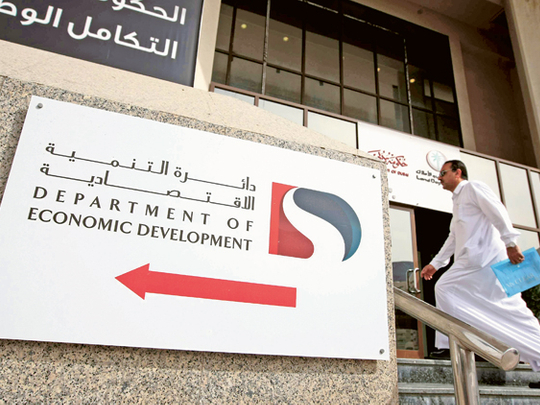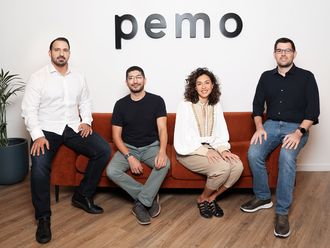
Dubai: The Dubai Department of Economic Development (DED) is planning to issue instant trade licences to investors under a new ‘120 days hassle free licence' initiative that will be launched this year.
The move, which will allow investors to have their licences issued immediately, will drastically simplify the investment and business registration process, depending on the risk factors of the intended business activity.
The UAE has improved its rank in Ease of Doing Business to 33 in 2012, up from 35 in 2011, under the World Bank's annual Doing Business report. DED said the scheme is aimed "to give businesses in Dubai a head start and promote the emirate's competitiveness".
"It is critical today that we ensure that the key sectors of our economy — trade, logistics, finance, knowledge sector, tourism, retail, and manufacturing and industry — are made even stronger and more competitive in this globalised age," Shaikh Hamdan Bin Mohammad Bin Rashid Al Maktoum, Crown Prince of Dubai, said.
DED, the government's trade licensing and regulatory body, renews and issues roughly 120,000 trade licences annually.
The 120-day licence allows businessmen to start businesses immediately and complete the rest of the licensing requirements, such as approvals from other government authorities concerned, within the subsequent 120 days.
Government authorities are entitled to ensure full compliance by the licence holder to the licence criteria on day 121.
The initiative, being implemented under the directives of His Highness Shaikh Mohammad Bin Rashid Al Maktoum, Vice-President and Prime Minister of the UAE and Ruler of Dubai, will simplify procedures and facilitate business.
Quick growth
"Dubai being a hub, various categories of businesses choose to set up in the emirate for faster growth and market access.
"The 120-day licence is part of DED's efforts to enable businesses to make full use of the advantages of Dubai and improve the emirate's ranking in the Doing Business Report of the World Bank," said Mohammad Shael, Chief Executive Officer of the Business Registration and Licensing (BRL) Division at DED.
Business activities have been categorised as no-risk, low-risk and high-risk for the sake of evaluating the risk component.
More than 90 per cent of the businesses in the emirate are no-risk or low-risk and therefore a vast majority of businesses stand to benefit from the 120-day licence.
For high-risk business activities constituting the remaining 10 per cent, such as restaurants and clinics, all standards set by the government authorities concerned must be fully met before DED issues the licence.
Dr Khalid Maniar, founder and managing partner of Horwath MAK, told Gulf News, "The move will definitely attract investment and improve the competitiveness of Dubai, and enhance its global ranking in doing business."
Shael said: "The categorisation depends on four main risk factors, evaluated on the basis of whether the business activity is harmful to human beings, harmful to animal life, harmful to plants, or harmful to the environment.
"When a businessman approaches DED for a licence, a 120-day licence is issued immediately, on completion of the necessary procedures, if the specific business activity falls under the no-risk or low-risk categories."
Positive
Jitendra Gianchandani, Chairman and Managing Partner at Jitendra Consulting Group, said, "At the outset, the initiative looks very positive. However, a business cannot function if bank accounts are not opened and visas are not issued.
"So I don't know how the banks and the Ministry of Labour will be reacting to this as they will be linked to this. Recently banks have implanted stringent KYC [know your clients/customer] requirements. With such type of temporary licence, how will they open the bank account?" he asked.
It reflects that all emirates are not working in unison, he said.
"This is already an existing problem for investors and it will add to further confusion in the future," he said.
Further clarification on the cost of issuing such licences and conversion to a permanent licence is needed, Gianchandani said.
The low-risk category includes chemical plants and similar industrial operations that require pre-approvals from various authorities including the Dubai Municipality and Civil Defence.
"As the standard classification of the activity book is issued by the Ministry of Economy, which is a federal government body, therefore classification of activities by DED as no-risk or low-risk requires changes in the activity book of the Ministry of Economy," Gianchandani says. "If they don't change [it], then it will create confusion and will add to the bureaucracy. Besides, the issuance of visas and bank account procedures in the case of ‘hassle-free licences' has to be clarified," Gianchandani said.
"In order to improve the rank as per the World Bank's ease of doing business, the same changes will have to be carried out across the UAE and not only in Dubai."
Non-Emiratis are already allowed to hold 100 per cent ownership in Dubai companies even without a free zone licence. Professionals such as doctors, technicians, carpenters, cooks etc can have 100 per cent ownership unless the entity is a Limited Liability Company (LLC).
Expatriates can only have 49 per cent ownership in LLCs with UAE nationals holding 51 per cent.
Philosophy
Referring to the 120-day hassle-free licence as a new philosophy of business registration and licensing, Shael said the initiative along with significant reforms like Law No 13 of 2011 will dramatically enhance the ease of doing business.
"These facilities have stringent standards often embedded in their design and they go through years of preparations and inspections. Hence there is no risk in issuing them a licence.
"It will in fact allow them to complete procedures like testing and hiring before starting actual operations," Shael said.
Law No 13 issued by Shaikh Mohammad in 2011 acknowledges the contributions of free zone companies to Dubai's economy and allows such firms to open branches in Dubai while maintaining their presence in the free zone.












